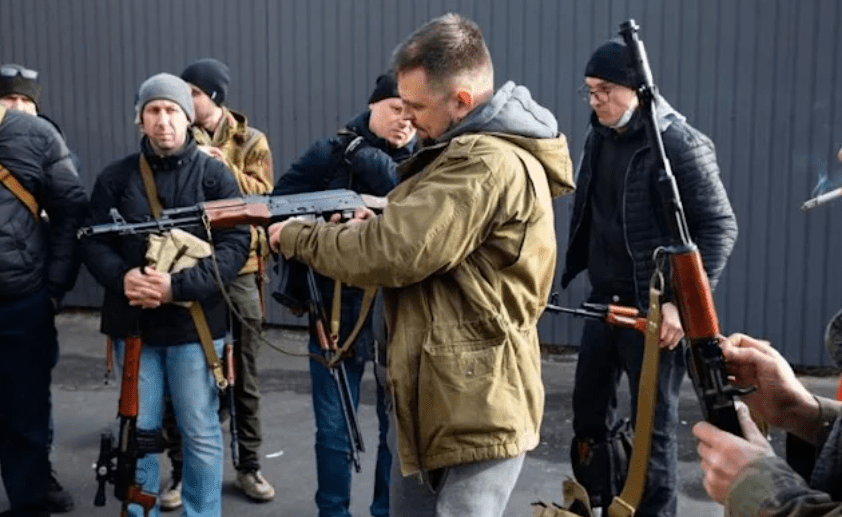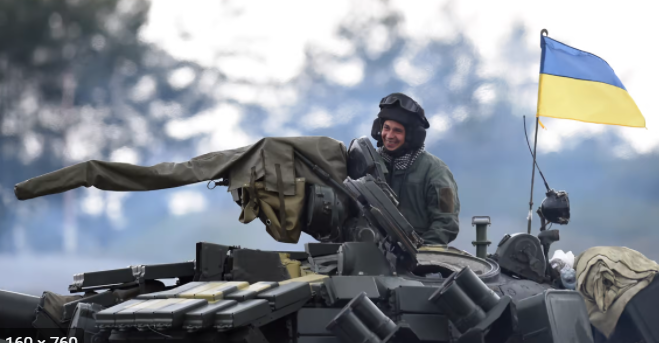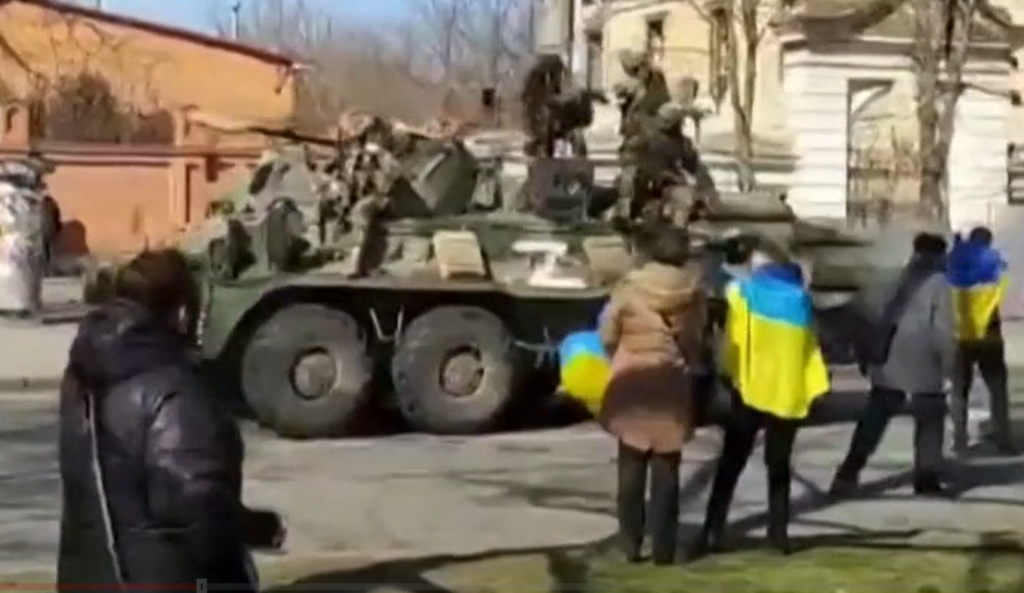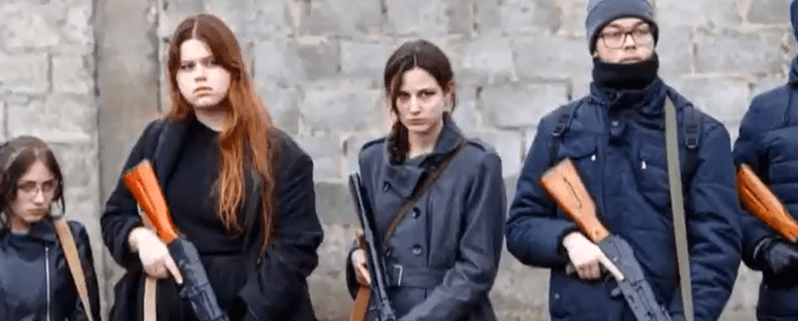By John Pickard
In an excellent Left Horizons Zoom discussion on the question of sanctions against Russia, there were a number of controversial issues raised, including whether or not workers in the West should support sending arms to Ukraine. There are many aspects of the current war that are worthy of comment, but it is worth exploring that one issue in some detail.
We might start with the fact that just over fifty years ago in Northern Ireland, there was a situation where ordinary working class communities were crying out for arms. In August of 1969, the Catholic Bogside of Derry was under furious attack from the sectarian police forces of Northern Ireland, the RUC and the B-Specials. A day later, riots erupted in Belfast and soon the Catholic communities there – some of them quite small enclaves – were also under siege. (Read our fiftieth anniversary article here).
These communities may not have been facing the might of the Russian army, but the RUC and Specials all had arms, including armoured cars, and members of those Catholic communities genuinely feared for their lives. They were facing a pogrom. The Provisional IRA did not exist at that time and the ‘old’ IRA had few weapons. These communities were forced to defend themselves with home-made petrol bombs and with little else; they were asking to be armed.
However, that is not the same situation faced by Ukrainian workers today. Ukraine is – or was – a major producer of small arms and the government has given out tens of thousands of Kalashnikovs to those who have volunteered. There is no shortage of these kind of arms. When president Zelensky calls for arms from the West, he is referring specifically to anti-tank and anti-aircraft weaponry, which he has been given by NATO states, including the UK.
Zelensky doesn’t just want arms, he wants a broader war
But above all he wants modern aircraft or a NATO-imposed no-fly zone. What Zelensky is asking for, in effect, is that Ukraine is treated as a de facto member of NATO. He is calling for the war to be broadened out, to become a Russia-NATO conflict, and socialists must oppose this. It has to be said, however, that NATO does not want to get involved in a confrontation with a nuclear-armed state, so despite Zelensky’s call for arms being partly answered, Ukraine is in a weak bargaining position in the current and ongoing talks between Russia and Ukraine.

The issue in the Left Horizons zoom meeting, however, was this – what should be the attitude of socialists in the West to appeals for arms, and what are workers in Ukraine likely to be saying and doing? In the Left Horizons article on February 28, we wrote the following:
“…socialists, where they can put forward slogans and demands, would support the principle of defending Ukrainian independence against Russian occupation – how could they not, when it is the overwhelming instinct of ordinary workers to protect their homes and livelihoods?
“But they would challenge the means employed by the Kyiv government and the still dominant influence, even in wartime, of the oligarchs and vested interests of capitalism and the rich…They would demand that the government arm all workers, on the basis of rank-and-file democratic control, and for fascist and semi-fascist militias to be disbanded”.
This argument is meant to draw a distinction between two different elements of self-defence: the ‘practical’ question of physical arms and the political character of the self-defence. Even in the instance we gave above, of the siege of the Bogside in Derry, the political issues were not neglected by socialists. Derry Young Socialists were very prominent in the physical defence of the Bogside, but that did not stop them from publishing a ‘Barricades Bulletin’ which raised the question of “working class unity”. Justifying the right of Catholics to defend themselves, it also said, that “People in Protestant areas have a perfect right to defend themselves if they feel they are going to be attacked by Catholic bigots”.
Fundamental outlook of socialists was for workers’ unity
There were reports in Northern Ireland then of joint defence patrols of Catholic and Protestant workers in a few areas of Belfast, including the Ardoyne. Nine thousand workers at a mass meeting in the Harland and Wolff shipyard declared their opposition to sectarian threats against Catholic workers. As we now know, these joint endeavours, no doubt promoted by heroic individual labour and socialist activists long forgotten, were overwhelmed by the tide of sectarianism that engulfed Northern Ireland in the months and years that followed.
But the fundamental outlook of Marxists in Northern Ireland, during the whole period of the Troubles – and since – was correctly based on the theme of ‘workers’ unity and socialism’. The point being that although physical arms were important to begin with, by far the most important factors, once Northern Ireland was ‘awash’ with arms (as it soon was) were the political questions.
It is not for us here to say what workers should do in Ukraine, but we are internationalists and it is not inappropriate to suggest, as we have done in previous articles, what socialists might or might be able to do in Ukraine. As the quotation above from a previous article makes clear, the situation in which Ukrainian socialists find themselves makes it absolutely imperative that they participate in the defence of their communities, their homes and their families, along with other workers. And who would oppose that right? No-one in the labour movement here.

Physical arms are important. It has been plausibly suggested, by serious commentators, that the slowness of the Russian advance in Ukraine has been in no small measure due to the over-reliance of the invaders on the use of military vehicles that can be disabled by anti-tank weaponry. Moreover, an over-use of main roads (rather than fields, for example) means that disabled vehicles create obstacles for those coming along behind.
But it is likely that the large majority of the arms that are coming from NATO countries, are not being put in the hands of Ukrainian workers, but in the hands of the government and government-sponsored militias. As far as small arms are concerned, there has never been any shortage of weaponry for Ukrainian workers willing to enrol in the defence of Ukraine, and they will have no choice into which military units or formations they enlist.
The need for an independent class position
But just as we have argued that the class struggle is not put ‘on hold’ during the pandemic in Britain, and neither should it be postponed in wartime, that is also true in Ukraine, in Russia and in the rest of Europe. As we also said in the article cited above, “It is not clear how much it is even possible for an independent movement of workers to exist and to campaign in Ukraine,” and socialists where they can, would be putting forward an independent class position.
Where they are able to, socialists – even while they are engaged in the defence of their communities – would be discussing with fellow workers about the need for a class programme, for the disbandment of neo-fascist militias, for the confiscation of oligarchs’ wealth in Ukraine, and for democratic structures for the military and paramilitary formations to which they belong, and so on.
This is the reason why the EC statement of the FBU is specifically better than the Unite EC statement. The FBU says, “We support workers in Ukraine acting independently of the Zelensky regime and building their own organisations and taking independent action. This should include attempts to build dialogue and links with rank-and-file troops in the invading Russian forces”.
As the FBU statement argues, socialists will be in favour of class appeals to Russian soldiers. It may be extremely difficult to have any contact at all with soldiers firing artillery from ten miles away, or with those hidden away in tanks, but it is not impossible. An independent working class position means opposition to Zelensky’s propaganda about ‘motherland’, the flag and all the other paraphernalia of nationalism that pervades so much of Ukrainian society.
Even the population of cities occupied by Russian forces, like Kherson in the south, have been making angry appeals to the Russian troops that they encounter on the streets. “Why are you here?” they are asking. This will have a shattering effect on the morale of young Russian soldiers. On the other hand, if these civilians were to melt away and be replaced by lone gunmen, killing odd occupying troops here and there, that would be a policy that would stiffen the resolve of the occupying forces, rather than weaken it.

In a nutshell, while arms may be an important factor, in a defensive war like that being carried on by Ukrainian works, a class approach to defence (including in the occupied areas) is more effective and more important that just physical arms.
Catastrophic humanitarian crisis
In the UK, where most Left Horizons readers are active in the labour movement, we face dramatic changes to our daily lives as a result of this war. We are not personally experiencing the catastrophic humanitarian crisis faced by Ukrainian families which has been so graphically put in front of us by the mass media. It is something that has understandably affected the outlook of workers across Western Europe.
But we will pay a heavy cost nonetheless, in terms of an unprecedented squeeze in living standards, the greatest in fifty years according to some estimates. What can we do? All we can do is to discuss, understand and argue our point of view and to explain to workers everywhere the absolutely crying need for social change…and to organise to put that change into effect.
There are no other alternatives facing us here in the UK: we either suffer the greatest impoverishment for generations – with no promise of any improvement in the foreseeable future – or we fight to change society, into one where wealth, resources, land and industry are planned democratically for the benefit of all. Even that struggle will affect Ukraine, because the best possible support we could give workers in that war-torn country would be the establishment of a socialist government here. That really would be an international game-changer.
As a post-script to this article (March 17), we note that the Ukrainian parliament, the Verkhovna Rada, has just passed a special law, Number 7160, on “the organisation of labour relations in Martial Law”, which threatens non-payment of wages for workers on leave – bearing in mind that many workers have volunteered into military units – wage cuts for the war effort and other forms of undermining workers’ rights. Some of these issues are mentioned on a Facebook post here.
These are precisely the kind of anti-working class policies that socialists will oppose in Ukraine, even while they are defending the country against invasion. There are few sacrifices being made by the Ukrainian wealthy and the oligarchs, and socialists would argue, therefore, that there should be defence of a workers’ Ukraine, not an oligarchs’ Ukraine.



